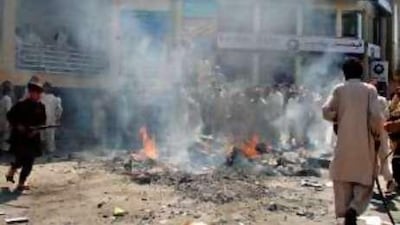MINGORA, PAKISTAN // The people of Swat in north-western Pakistan are caught between Taliban militants and intensive military operations. The army operation in Swat will be a barometer of whether the Pakistan military can defeat militants and win the support of locals - or be condemned to repeat the mistakes of coalition forces in neighbouring Afghanistan, namely of causing civilian deaths and providing no succour for locals.
The fight for hearts and minds hangs in the balance. On Tuesday, police killed five people and wounded several others when they opened fire on a crowd that was protesting in the district capital, Mingora, against worsening security. Demonstrators, who demanded an end to military operations and the provision of amenities and food, set fire to three banks. Pakistan's leadership has vowed to intensify its battle against militants following a lorry-borne suicide bomb attack that killed at least 53 people at a luxury hotel in the capital on Saturday.
The military had already embarked on a campaign in the tribal area of Bajaur, where it claims to have killed more than 700 militants since the beginning of last month. This week, it claimed to have killed 50 militants in Darra Adam Khel, an area on a key transport route near Peshawar, the provincial capital of the North West Frontier Province (NWFP). Militants from the Mohmand tribal area attacked police posts in Shabqadar, near Peshawar, on Monday. Then the military opened another front by shelling militants in the Mohmand tribal agency.
The valley of Swat was until recently popular with tourists and was famed for its peaceful, idyllic holiday spots. Swat was a princely state under the British Raj and continued to be independent after the partition of the Indian Subcontinent and the creation of Pakistan in 1947. However, in 1968, Swat was integrated into Pakistan. The fierce and summary justice of the monarch, the Akhund or Wali as he was known, was replaced with the patchy government system.
Now Cobra helicopters dip and clatter above Mingora, and fire high explosive rounds into militant positions in the surrounding hills. The city is exposed. Police stations at its edges have faced numerous attacks and locals have fled from villages on the outskirts to escape militant harassment and the military's artillery. Last year, the Pakistani military launched its first operations in the area after a local so-called cleric, Mullah Fazlullah, announced he would launch suicide attacks against the government. His men then staged several deadly assaults on police officers.
Mullah Fazlullah's campaign against the government started after a commando operation targeted Islamabad's radical Red Mosque, in which more than 100 people were killed. Military operations resumed this year after a peace deal with Mullah Fazlullah, which was brokered by NWFP's government after elections in February, broke down. Since then the army has claimed to have killed 130 militants as it has continued to pound militant positions around Mingora.
Heavily fortified army checkpoints have been set up and bunkers erected on Mingora's outskirts. Beyond the army positions lie militant checkpoints. The atmosphere in Swat is one of fear and confusion. At the offices of a local newspaper, the editor rubbished the army's daily claims of the numbers of militants killed. But he is caught in the crossfire. He received a letter from the Taliban that morning warning that "people without beards, those who drive on the left of British and not right of the Arab, those who sell shaving kits, make-up or bras will be killed".
"Nobody told them that the Americans drive on the right," he said. The editor then received a telephone call from a militant commander complaining that he has given unwarranted headline space to army propaganda. Locals believe Pakistan's intelligence agencies spent several years building up Mullah Fazlullah, who was a former ski-lift operator with no previous local backing and now commands the Tehreek-e-Nafaz-e-Shariat-e-Mohammadi, a group with links to the Pakistani Taliban.
The mullah appealed to popular frustration over a lack of justice and an unfulfilled government pledge to impose sharia law by broadcasting sermons via his own FM radio station. Mullah Fazlullah made his mark by sending his vigilantes to resolve common people's grievances. "If somebody's daughter was abducted or if there was a land dispute, Fazlullah's men killed the culprits and gave some form of justice," Mr Ali said.
However, the mullah became progressively more powerful and the government failed to arrest him. They made one botched attempt after Friday prayers when he was surrounded by thousands of his followers. The ranks of his armed followers were swollen with hard-core militants from the tribal area of Waziristan and a group led by a leader from the military intelligence-linked terrorist group, Jaish-I-Mohammed.
Mingora's government buildings are pocked by suicide blasts and rocket attacks. The militants have targeted the security forces and have bombed 130 government-run schools. In a campaign similar to that which wiped out 120 tribal leaders in Waziristan, militants have begun to methodically assassinate Swat's politicians from the NWFP's ruling Awami National Party (ANP). The militants have established a base in Dir's town of Maidan. In Maidan, in the green valleys of Dir, there is a mini-frontline of encroachment. Armed Taliban outside were visible in fields surrounding the town.
Funeral prayers were being offered for Mehmud Jan, the right-hand man of Sufi Mohammed, a former TNSM militant leader. A friend said Jan was "courageous to talk against the Taliban". He said that militants were openly flaunting weaponry and training but have now "constrained themselves to the hills". But fear had silenced mourners at the funeral prayers. Militants had riddled Jan with bullets in front of his house. Last week, 20 more locals were killed and 30 wounded when militants hurled grenades and fired indiscriminately into a Dir mosque.
"Nobody knows who to trust. Fear is everywhere. We do not look anybody in the eye," said Jan's friend. iwilkinson@thenational.ae

